From Robbie and Geri to Fatboy Slim and Vindaloo: the biggest music moments of 1998
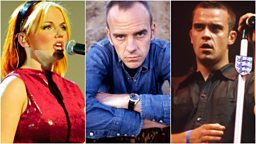
By Fraser McAlpine, updated 28 August 2019
1998 was a fascinating year for music, one that saw the UK moving away from Britpop, Robbie Williams emerging as the newly-crowned king of British pop, and the Spice Girls losing a key member of the group.
Meanwhile, Fatboy Slim released his monster album You've Come a Long Way, Baby, which went to No.1, spawning hits including the immortal The Rockafeller Skank and the chart-topping classic Praise You, the latter coming complete with an iconic video.
The making of this musical landmark is explored in a Radio 2 documentary, Norman Cook: You've Come A Long Way Baby, which sees him re-examine the songs, samples and beats that inspired the record that changed his life.
We may have come a long way (baby) from 1998, but let's take a look back at the biggest music moments from the year - starting with Norman Cook's chart domination.
1. It was an amazing year for Fatboy Slim
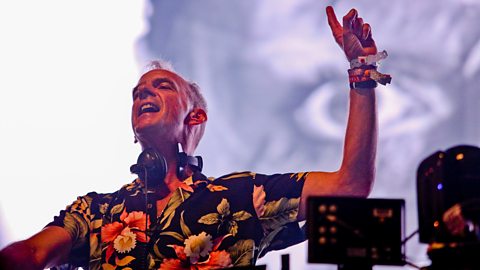
Fatboy Slim: "I need to smell and hear the audience"
Norman Cook on his upcoming tour and the 20th anniversary of You've Come A Long Way Baby.
Before Fatboy Slim's pop success, former Housemartin Norman Cook made his name as a DJ at the mid-90s Brighton club night, Big Beat Boutique, the home of his label Skint Records. The tunes he'd play there - a mix of funk, house and sped-up hip hop - would be filleted and jammed into his trusty Atari computer, before emerging as new songs. Having already released a solid, acid-house indebted first album Better Living Through Chemistry, Norman put his record collection to work, looking for the most infectious breakbeats and funky vocal hooks.
The first fruit of this new approach was his 1997 remix of Wildchild's Renegade Master, in which he took a house track and gave it a funky backbeat, which made it sound like a cross between House of Pain and The Chemical Brothers. That track charted at Number 11, but it was The Rockafeller Skank, with its infectious hook, "Right about now, the funk soul brother", that caused everyone to really sit up and take notice.
Warning: Third party content may contain adverts
Cook also gathered momentum from a clutch of big festival appearances - including Glastonbury, Creamfields and T in the Park - and he'd make more records in order to DJ with them. His remix of Cornershop's Brimful of Asha in particular was one of the biggest dance anthems of the year.
And then there was Praise You, a song built from an a capella moment by Camille Yarbrough, and a piano sample on a test record. It shouldn't have worked, but it quickly became a firm favourite among pop fans and ravers alike. Spike Jonze's beautifully daft video certainly helped, too. The guerilla-style video, which can be seen as a precursor to the phenomenon later known as a flash mob, featured a dance troupe spontaneously throwing shapes in public, much to the confusion of onlookers. It remains one of the most iconic videos of the 90s.
Watch highlights of Fatboy Slim at Glastonbury 2016 below:
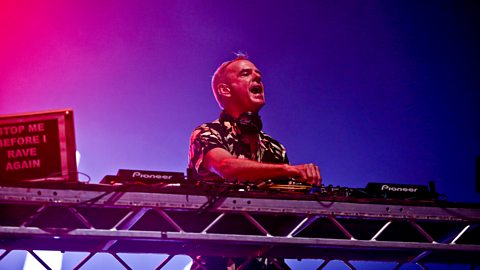
Fatboy Slim - Glastonbury 2016 Highlights
Brighton's award-winning DJ veteran returns to keep the rave alive at Glastonbury.
2. It was a big year for iconic videos in general
Warning: Third party content may contain adverts
Spike Jonze baffling people in a cinema queue for Praise You was by no means the only memorable video moment of the year. There was also Britney Spears' ...Baby One More Time, a clip that catapulted her to pop stardom, and Will Smith's Miami video, which cost $2million after the Men In Black star flashed the cash on extravagant speedboats and plush cars.
Not to be outdone in the bedazzlement stakes, Robbie Williams put on a low cut rhinestone catsuit and KISS-inspired makeup for Let Me Entertain You, while Beastie Boys invaded Japan in a breakdancing robot in Intergalactic. Elsewhere, Oasis rode a flying saucer in the Yellow Submarine-inspired video for All Around the World, Shania Twain wore her iconic leopardskin hoodie in That Don't Impress Me Much and Madonna appeared to be radiating electricity in the artfully time-lapsed Ray of Light video.
3. Remix culture dominated
Warning: Third party content may contain adverts
Fatboy Slim wasn't the only alchemist-like producer making gold out of the base metals of musical source material in 1998. US DJ Jason Nevins topped the charts for six weeks with his huge house remix of Run-D.M.C.'s It's Like That. As well as its video's showstopping breakdance battle, Nevins' remix also made headlines by breaking the Spice Girls' run of consecutive No.1 hits, meaning that the group's Spiceworld single Stop had to settle for second spot.
Then there was The Corrs, whose single What Can I Do? only managed to reach Number 53 upon its initial release in January 1997, before gaining new life thanks to a remix from Tin Tin Out, faring much better the second time around by making it to Number 3. Todd Terry repeated the trick for the group's track Dreams, as did K-Klass for So Young. Remixers, it seemed, had the magic touch.
But remixing didn't always reap rewards.1998 was also the year Slade released a dance remix of Merry Xmas Everybody - an attempt to capitalise on the vogue of remixing that failed to live up to the magic of the original.
4. Geri shocked the world by leaving the Spice Girls

Why Geri couldn't wait to see Chris about her new single...
Geri Horner tells Chris how George Michael inspired her return to singing.
Stop, the Spice Girls track that Jason Nevins and Run‐D.M.C. kept from top spot, was the last single from the group as a five-piece. On May 31 1998, Geri Halliwell (now known as Geri Horner) announced that she was officially leaving the girl group, effective immediately.
The band were in the middle of a European tour with dates still to play, but Ginger Spice had already got off the double decker Spice bus and gone home. In a statement to the press, she said: "I have left the Spice Girls, this is because of differences between us. I am sure that the group will continue to be successful, and I wish them all the best. I have no immediate plans and I wish to apologise to all the fans and to thank them and everyone who's been there. Lots of love Geri. PS: I will be back."
Halliwell's promised return would not come until the following year, by which time the remaining Spice quartet had released and promoted the single Viva Forever - the video for which was an animated fantasy featuring a cartoon Geri - and then the song Goodbye, which Geri had a hand in writing. It became a fond farewell to their first flush of pop dominance.
Of course, Geri has reunited with her Spice Girls bandmates on a few occasions since – not least in 2019, when all members (except Posh) got the band back together for a UK tour. They also reconvened for a world tour in 2007/2008 and a one-off performance at the London Olympics in 2012.
5. Robbie Williams conquered the charts
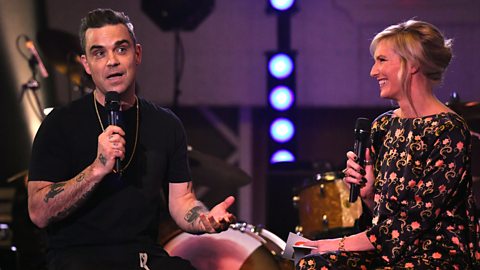
Ask Robbie Williams: In Conversation
Jo Whiley puts your questions to Robbie ahead of his Radio 2 In Concert performance.
Speaking of solo careers, the year was full of them. Geri's former Spice Girls bandmates were seemingly eyeing lone moves too, with Mel B topping the UK chart with Missy Elliott collaboration I Want You Back, while Melanie C reached Number 3 with Bryan Adams duet When You're Gone. Elsewhere, Ian Brown, formerly of The Stone Roses, had released his debut solo single My Star in January. 1998 was also the year Robbie Williams finally put any lingering doubts as to his superstar status behind him and became the nation's biggest pop star.
Robbie's rise after leaving Take That had been relatively slow, his cover of George Michael's Freedom and boisterous singles like Old Before I Die only hinting at what was to come. But then came Angels. Released in December 1997, the track only peaked at Number 4 in the chart but slowly and surely won the listening public over. Williams' performance of the song at 1998's Glastonbury Festival sparked a mass singalong from the crowd - and the song has since become not only Robbie's most-loved hit, but one of the nation's most cherished personal anthems, once voted the most popular song to be played at funerals.
This set Robbie up for a very stellar 1998. Williams' follow-up hit, Let Me Entertain You, was unlike any other pop single that year - a blast of old fashioned rock with a hint of musical theatre - and he filmed the outrageous video the day after performing with Tom Jones at the 1998 Brit Awards, so his confidence was certainly peaking. By September he had secured his first No.1 solo single with Millennium and his second No.1 album with I've Been Expecting You. It was an important 12 months for Williams, and one instrumental to his long-lasting staying power.
6. Cher changed the sound of music with Believe
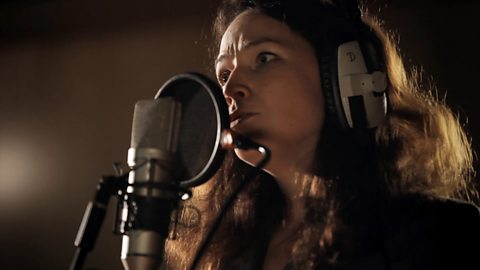
Cher's 'Believe' single and Auto-Tune
How the vocal processing effect jumps between the notes of the singer's scale.
In 1998, Cher introduced the world to a new pop sound and pretty much changed pop forever. Her hit Believe had been the product of a lot of experimentation in the studio - six different songwriters and two producers - which was eventually finished with the help of Auto-Tune, a new plug-in for digital recording software designed to subtly correct pitching errors in singing.
Believe's producer Mark Taylor turned it on full, to see what would happen, and found Cher's voice would seem to glitch from note to note in a kind of robotic warble. Often compared to a vocoder - which uses the sibilance of speech to modulate synthesised sound - Auto-Tuned vocals still use the actual sound of Cher's voice, and coupled with a killer chorus, it helped to put her at the heart of the 90s dance revolution.
Cher single-handedly made AutoTune a standard studio production effect for the future. Given that she can palpably sing, why not use it as a production tool? Kanye West certainly agreed, his 2008 album 808s & Heartbreak made great use of that mournful robotic tone. And you'd be hard pushed to find a big pop tune of the past decade that hasn't used a similar form of digital tinkering.
7. Celine Dion’s My Heart Will Go On was a massive hit thanks to Titanic
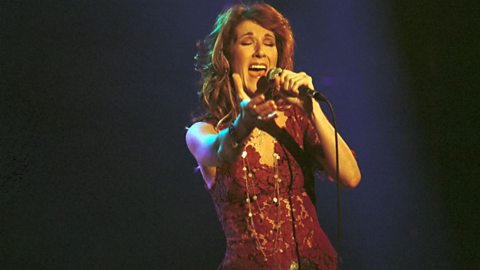
Celine Dion is inducted into the Singers Hall of Fame
Aimée nominates Celine Dion for Michael Ball's Singers Hall of Fame
It may have been released in the US during December of the previous year, but it wasn't until February 1998 that Céline Dion's My Heart Will Go On made it to the UK, following the opening of Titanic in British cinemas during January. The track topped the UK chart, and has since gone on to become one of the best-selling singles of all-time, shifting 18 million copies worldwide - fewer than Elvis Presley's It's Now or Never (20 million copies) but more than Mariah Carey's All I Want for Christmas Is You (16 million copies).
Celine's song, as well as being a top drawer power ballad, was part of a larger trend - the big song taken from a hit movie. Titanic was such a huge film (the first movie to bring in over $1 billion) and its soundtrack became one of the biggest selling albums of 1998.
The year had some other huge movie-related power ballads, including Aerosmith's first US No.1 single, I Don't Want to Miss a Thing, taken from the film Armageddon. Jamiroquai provided some funk too, contributing Deeper Underground to Godzilla. Meanwhile, Christina Aguilera's debut single Reflection featured on the soundtrack to Disney movie Mulan. A slightly less iconic hit, it nonetheless paved the way for subsequent career-establishing songs such as 1999's Genie in a Bottle.
8. B*Witched and The Corrs put a spin on Irish music
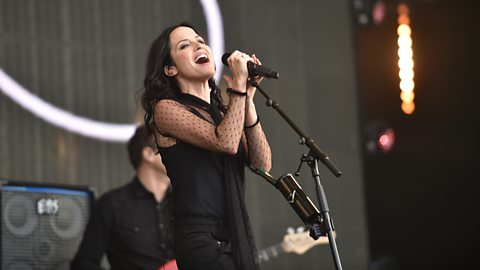
The Corrs
Highlights of The Corrs' set at Radio 2 Live in Hyde Park 2015
It may not seem as if the super-chipper B*Witched and the more refine siblings in The Corrs have a lot in common, but both acts emerged in 1998 from a standing start to take their respective places among the biggest musical acts of the year. Both bands have strong family ties - twins Keavy and Edele Lynch in B*Witched, and we all know the Corrs are siblings, right? - and both used some of the traditional melodies of Irish folk music to give their music a specific sense of identity.
C'est La Vie was one of the biggest pop hits of the year, making B*Witched the youngest girl group ever to have a UK No.1. And how can we neglect to mention that glorious jig towards the end of the song's video? 1998 was also the year that The Corrs album Talk on Corners - which had been released the year before - broke through. Their beautiful Runaway was a contemporary rock song with the feel of an ancient folk lament, thanks to Sharon Corr's violin.
9. It was a good year for girl groups
Thanks largely to the global Spice phenomenon, pop had taken a renewed interest in girl bands in 1998. B*Witched hit No.1 with their first four singles, Spice Girls had two of their own chart-toppers (Viva Forever and Goodbye) and All Saints had one of the biggest hits of the year with Never Ever (despite it originally being released the previous November, the song stayed in the UK top 10 for 15 weeks, charting for 26 weeks overall, becoming an ever-present soundtrack to 1998). All Saints had a tremendous year all round, following the mega-hit with their cover of Red Hot Chili Peppers' Under the Bridge.
Other big girl groups that year included Cleopatra, whose catchphrase "comin' atcha" remains a part of the public consciousness, and Vanilla, whose No Way No Way was based upon Mah Nà Mah Nà by Italian composer Piero Umiliani, a tune made most famous by a Muppets parody.
10. Women ruled 1998, basically

Billie Piper: "I'd never go back to singing!"
Billie chats about her new film City Of Tiny Lights, talks Swindon and her pop career.
It wasn't just the groups either. Most of the big pop breakthroughs of 1998 were by female acts. Britney Spears announced her arrival in no uncertain terms, Madonna had taken a deliberate step back to her roots in club music on her rejuvenating album Ray of Light.
Elsewhere, former Fugee Lauryn Hill released her debut solo album to blanket praise from fans and critics alike. The Miseducation of Lauryn Hill blended hip hop with the emotive weight of soul and gospel, with songs such as Doo Wop (That Thing) and Ex-Factor empowering a generation. The year's freshest new star was Billie Piper - then simply known by the mononym of Billie - whose hits Because We Want To and Girlfriend were as brash and vibrant as the early Spice singles. She would go on to release Honey to the Bee, inspired by the gospel lope of Never Ever, which would in turn inspire Black Box Recorder's 2000 Top 10 hit The Facts of Life. Piper, meanwhile, would later find further stardom in acting, most famously playing the beloved companion Rose in Doctor Who.
11. The World Cup spawned some iconic football songs
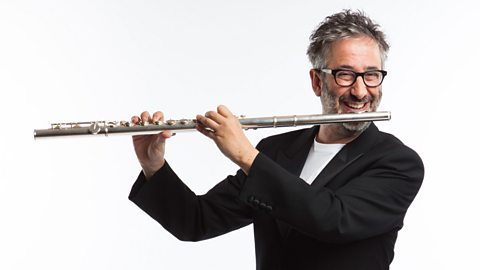
David Baddiel: "If you want to you could play the bins or the triangle!”
David Baddiel tells you how to take part in Last Night of The Proms with BBC Get Playing
There were a LOT of football songs in 1998, the year that saw hosts France win the World Cup and a pre-Livin' la Vida Loca Ricky Martin providing the official song of the tournament in the form of The Cup of Life (or La Copa de la Vida in Spanish). Martin's track has since been somewhat overshadowed by the other crossover offerings that year between music and the beautiful game...
The England team's official song was the stately (How Does it Feel to Be) On Top of the World by England United - a supergroup comprising Echo and the Bunnymen, Space, Simon Fowler of Ocean Colour Scene... and the Spice Girls. That sure sounds like a recipe for success but the song faced stiff opposition in fans' affections from Three Lions '98, a reworked version of Three Lions (Football's Coming Home) by David Baddiel, Frank Skinner and The Lightning Seeds, a terrace classic now considered to be English footy's de-facto national anthem.
The Scottish squad were supported by the winsome, charmingly optimistic Don't Come Home Too Soon by Del Amitri, perhaps the only football song in history to hold such modest ambitions. But really, the biggest, rudest, most attention-grabbing football song of the year Fat Les' Vindaloo as a kind of full-blown raspberry against, well, everything. The refrain of "We're going to score one more than you" continues to be the most succinct football chant ever written.
Further reading
Like us on Facebook, on Instagram at bbcradio2, or follow us on Twitter @BBCRadio2
Listen to Radio 2 on BBC Sounds, or find out other ways you can listen.















